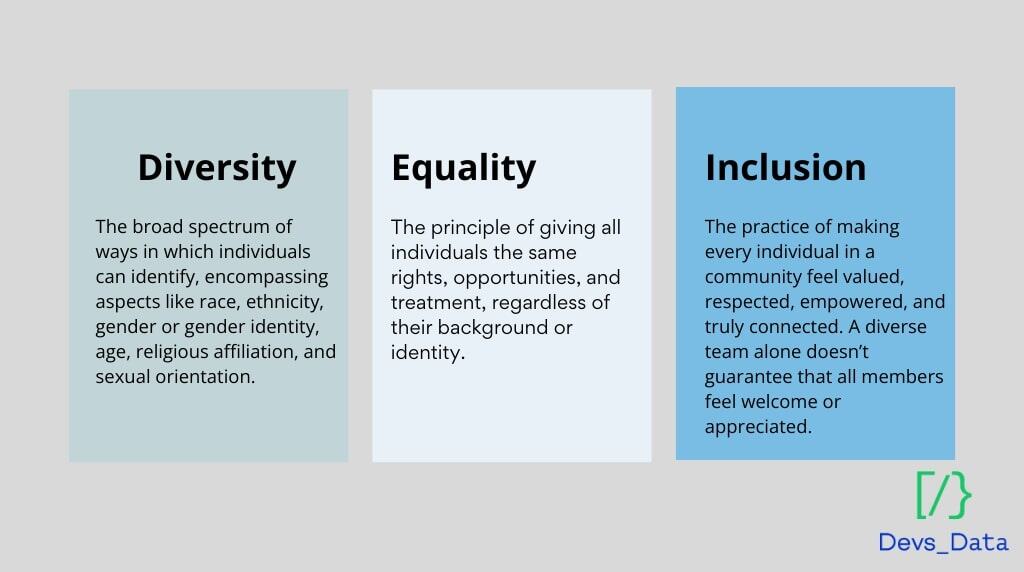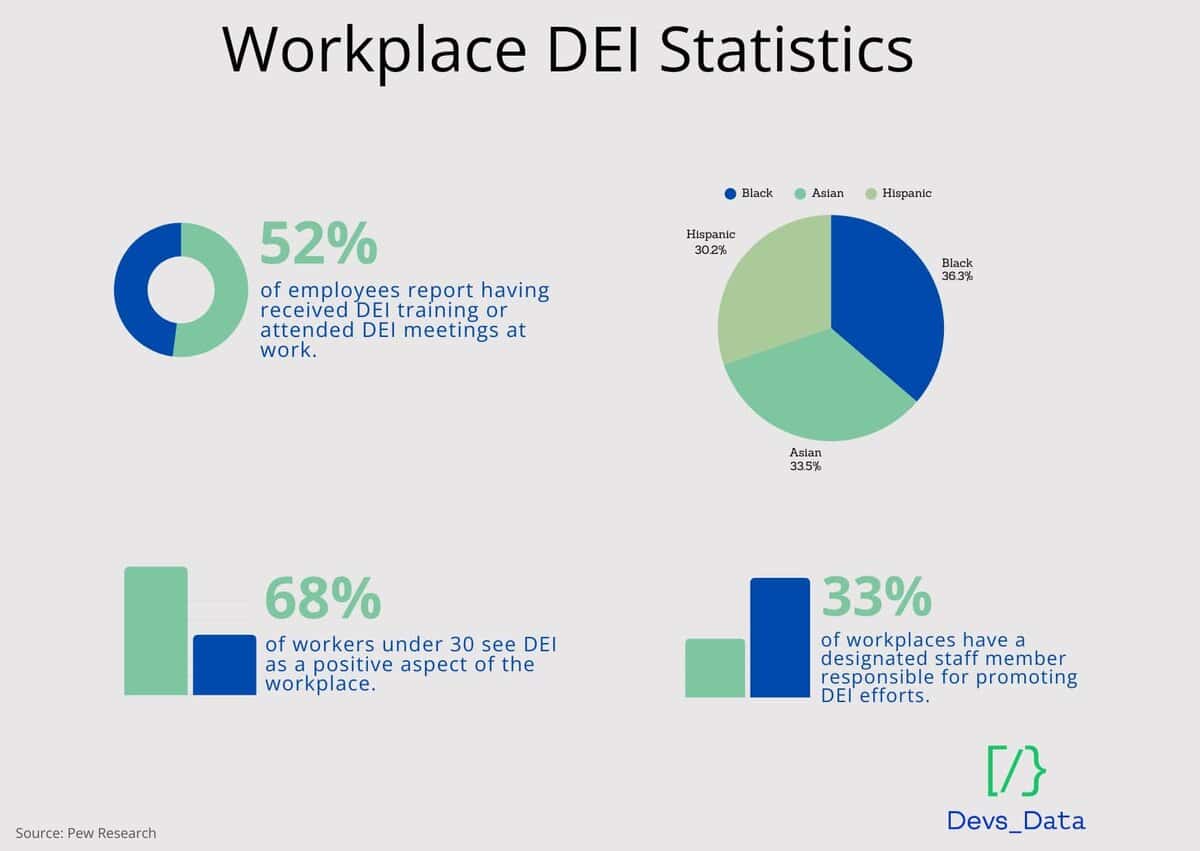


Do you want to create a workplace that values diversity and treats everyone fairly? It all starts with inclusive hiring practices. By embracing a recruitment process that welcomes individuals from all backgrounds, you can build a fair environment while uncovering exceptional talent.
Inclusive hiring is more than just a strategy. It’s a vital cornerstone of building a diverse, equitable, and inclusive workforce.
According to a McKinsey report on diversity, companies with more diverse teams are 36% more likely to outperform their peers in terms of profitability.
Another study by Boston Consulting Group found that companies with above-average diversity on their management teams reported 19% higher innovation revenue. Diverse teams bring new ideas, drive innovation, and help businesses grow. By focusing on inclusive practices, you can reach a wider range of talented people and make your workplace more impactful.
In this guide, we explore the importance of inclusive hiring and provide clear strategies to support every stage of the process, from identifying common barriers to building diverse candidate pipelines and retaining talent in the long term.
Inclusive hiring goes beyond simply considering gender and race in recruitment. It’s about connecting with, interviewing, and hiring individuals from a wide range of backgrounds and perspectives, valuing diversity in all its forms. By adopting inclusive hiring practices, organizations create a fair environment where all candidates have equal opportunities, helping build teams that reflect the diverse world around us. This approach positions businesses to better understand and respond to the needs of a global and diverse customer base.
To build a truly effective hiring strategy, it’s important to understand the foundational concepts: diversity, equity, and inclusion. These terms define the broader context of inclusive hiring and help shape practices that support fairness and belonging throughout the recruitment process.

Diversity, equity, and inclusion (DEI) refers to efforts that promote fairness, representation, and equal access to opportunities across an organization. While these practices support ethical standards, they also contribute to measurable business performance.
Teams with varied backgrounds often approach problems differently. This range of perspectives leads to more effective decisions, better adaptability, and stronger alignment with customer needs. Inclusive workplaces also tend to see higher engagement and lower turnover.
Key data points include:

Inclusive hiring is about creating opportunities for everyone, but several barriers can make it harder for underrepresented groups to gain access to those opportunities. These barriers can come from biases, outdated processes, or even well-intentioned practices that unintentionally limit diversity. Let’s take a look at some of the most common barriers and how they can impact your organization’s efforts to hire inclusively:
Unconscious bias often influences decisions in subtle ways. A hiring manager might favor candidates who attended the same university or share similar interests, even if those factors have no connection to job performance. These patterns can lead to qualified applicants being overlooked.
To address this, companies can provide regular training that helps recruiters and interviewers recognize where bias may appear and how to reduce its influence. Standardizing interview questions and using consistent scoring criteria helps focus evaluations on relevant skills. Including people from different teams or backgrounds in the interview process can also bring more balanced perspectives. In early screening stages, reviewing resumes without names or photos helps redirect attention to qualifications and experience.
The words used in job descriptions can unintentionally exclude strong candidates and undermine diversity goals. For example, terms like “fast-paced” or “ninja” may signal a preference for a narrow personality type, while “native speaker” can unnecessarily disadvantage multilingual applicants who are fully qualified.
Overly technical language or vague expectations may also discourage candidates from underrepresented groups, who often self-select out if they feel they do not meet 100% of the requirements.
Writing clear and accessible descriptions that emphasize actual responsibilities and essential skills helps create a more inclusive process. Removing non-critical qualifications, such as specific degrees or rigid years of experience, expands opportunities to candidates with diverse backgrounds. In multilingual regions, providing listings in multiple languages can also broaden reach and foster equity.
When roles are only shared within the same networks or platforms, the applicant pool can become narrow and repetitive. Candidates from different regions, communities, or education paths may never see the opportunity.
Expanding outreach to a wider set of job boards, professional associations, and community organizations can help reach people from varied backgrounds. Hosting online events, engaging with career services at smaller or public institutions, and working with groups focused on workforce development are all ways to diversify your pipeline. Reviewing sourcing results regularly also helps identify where gaps remain.
Hiring decisions based on cultural similarity often favor candidates who feel familiar rather than those who offer new perspectives. While shared values are important, focusing too much on similarity can result in teams that think alike. A better approach is to look at skills and contributions to team goals. Instead of asking whether a candidate fits the current culture, consider what strengths or viewpoints they bring that others may not.
Clarifying which values are core and which are flexible helps guide hiring in a fair way. When defined carefully, culture fit can work alongside DEI by centering on qualities such as respect, teamwork, and adaptability rather than background or personal identity.
Listing advanced degrees or highly specific job history as must-haves can exclude people with real-world experience who learned through alternative paths. Many capable candidates build skills through freelance work, online learning, or self-directed projects.
Evaluating applicants based on demonstrated ability rather than academic credentials opens access to a broader range of talent. Accepting portfolios, case studies, or practical assessments helps reveal what candidates can do. Including a note in the job description that welcomes non-traditional backgrounds encourages more people to apply. Regularly reviewing qualification standards can also help remove outdated or unnecessary barriers.
Standard hiring practices can unintentionally exclude people who face physical, logistical, or technological challenges. For example, requiring travel for interviews or expecting candidates to use unfamiliar tools may limit participation.
Creating accessible hiring processes means offering remote interviews when needed, extending deadlines if requested, and using platforms that support screen readers or keyboard navigation. Providing clear instructions and an easy way to ask questions can also improve the experience for all applicants. Including an accessibility statement in job posts shows that your company takes inclusion seriously.
Interviews that are conducted without consistent questions or evaluation criteria can make hiring less fair. In these situations, candidates may be judged based on personality, small talk, or the interviewer’s personal impressions rather than skills. This can unintentionally favor those who resemble the interviewer or who are more confident in informal settings.
A more balanced approach is to use structured interviews, where each candidate is asked the same set of questions and scored on the same rubric. This makes it easier to compare candidates fairly and keep the focus on relevant skills and problem-solving ability. Adding multiple interviewers from different teams can further reduce the risk of bias and provide a broader view of each applicant’s potential.

Inclusive hiring is not only a matter of ethics and business performance. It also intersects with important legal obligations. Both the United States and countries across Europe have specific regulations aimed at preventing discrimination in the workplace and promoting equal opportunity.
In the United States, laws such as Title VII of the Civil Rights Act, the Americans with Disabilities Act (ADA), and the Equal Pay Act prohibit discrimination based on race, gender, age, disability, religion, or national origin. For instance, women still earn about 83 cents for every dollar earned by men, highlighting ongoing pay disparities despite existing equal pay legislation. Employers are also required to maintain fair hiring processes, prevent harassment, and provide reasonable accommodations in addition to ensuring pay equity. Failure to comply can lead to costly lawsuits, reputational harm, and penalties issued by the Equal Employment Opportunity Commission (EEOC). In recent years, several companies have faced significant fines and legal action due to discriminatory practices in job advertising, biased screening tools, or wage disparities.
For example, Facebook settled with the EEOC over allegations of discriminatory job ads that excluded older workers, while Amazon faced lawsuits over claims that its hiring algorithms disadvantaged women. These cases highlight how even large employers can face scrutiny when technology or policies reinforce bias.
In Europe, anti-discrimination regulations are enforced both at the national and EU levels. The EU Equal Treatment Directives require member states to protect workers from unequal treatment in recruitment, pay, and promotion. Countries like Germany, France, and the Netherlands have implemented mandatory gender pay gap reporting for larger employers.
In the UK, companies with 250 or more employees are required to publish their gender pay gap data annually. Failure to comply can result in public scrutiny, sanctions, and exclusion from government contracts.
Beyond regulatory consequences, ignoring these requirements can directly impact a company’s ability to attract and retain talent. Candidates increasingly expect transparency, fairness in advancement opportunities, and visible representation across leadership levels, not just equitable pay. A reputation for bias in hiring or promotion can damage employer branding. Proactive compliance not only mitigates risk but also strengthens organizational culture and employee trust. For example, countries such as Finland and the Netherlands have introduced proposed fines under the EU Pay Transparency Directive, which obliges companies to disclose pay data and take corrective action when unjustified gender pay gaps of 5% or more are found.
Do you have IT recruitment needs?
One effective way to reduce bias is by using tools that anonymize candidates during the evaluation process. These tools help eliminate identifiers such as names, photos, or other details that may trigger bias. Here are two tools worth considering:
Unbias.io is a Chrome extension that removes faces and names from LinkedIn profiles to reduce the effect of unconscious bias. By focusing on the qualifications and experience of the candidate, this tool helps you assess them more fairly.
Interviewing.io is a platform that provides anonymous technical interviews designed to address biases that may exist within the hiring process, particularly in competitive fields like Silicon Valley. By removing personal identifiers, this tool helps ensure that the evaluation is based solely on skills and performance.
Structured interviews, in which all candidates are asked the same set of standardized questions and assessed according to clearly defined criteria, are proven to minimize bias. By maintaining consistency across interviews, hiring teams can ensure that all candidates are judged based on the same factors. It’s beneficial to run workshops with your hiring teams to develop question banks and to focus on values-based and behavioral interview questions. Additionally, interviewers should evaluate candidates individually and privately, using a scoring system to help keep assessments objective and prevent groupthink from influencing decisions.
Including individuals from diverse backgrounds on your interview panels is an essential step in fostering a more inclusive hiring process. When multiple perspectives are brought to the table, it helps ensure that all candidates are evaluated fairly and reduces the potential for bias. A diverse panel also signals to candidates that your organization values diversity and is committed to maintaining an inclusive environment. While coordinating broader panels may lengthen the hiring process slightly, the benefits in fairness, candidate trust, and long-term team strength make it a worthwhile investment.

Retaining diverse talent goes beyond recruitment, as it’s about fostering an inclusive environment where employees can thrive. To do so, companies must focus on creating a culture that embraces diversity at every level.
Creating a sense of belonging is vital for retaining diverse talent. Encourage the formation of Employee Resource Groups (ERGs) to support underrepresented groups within your company. These groups, such as Google’s Gayglers, Greyglers, and Hispanic Googler Network, are voluntary and employee-led, offering a platform for individuals to connect, share experiences, and provide mutual support. ERGs foster a community and offer valuable resources and advocacy, creating a space where employees feel heard and valued. This leads to higher engagement, retention, and overall job satisfaction.
Open, honest communication about diversity and inclusion is crucial for fostering an inclusive workplace. Provide safe spaces for employees to share their experiences and challenges related to DEI. Utilize platforms like Slack channels or intranet forums to circulate articles, news, and resources on diversity topics. In addition, consider hosting roundtable discussions or listening sessions where employees, especially those from underrepresented groups, can openly voice their concerns and offer suggestions for improvements. These dialogues are essential for awareness and building trust, and ensuring that employees feel their voices are valued.
Celebrating key cultural events and holidays is a great way to promote diversity and raise awareness within the organization. Recognize important events like Black History Month or International Women’s Day by hosting company-wide celebrations, educational events, or social gatherings. These occasions provide an opportunity for all employees to come together, learn about different cultures, and show solidarity with their colleagues.
An inclusive workplace must offer clear opportunities for career progression, especially for employees from diverse backgrounds. Establish transparent, standardized pathways for advancement that set clear, achievable goals for all employees. It’s important to have managers who are trained in recognizing and supporting talent from underrepresented groups, ensuring that everyone has an equal opportunity to grow. Mentorship programs can be particularly impactful, as they provide guidance and support from senior leaders or peers. Having role models from diverse backgrounds helps employees see that advancement is possible and encourages them to take ownership of their career development.
Together, these practices help foster a workplace where diverse employees feel supported and motivated to stay long term. With retention strengthened from within, the next step is finding the right partner to attract and recruit talent inclusively from the start.
DevsData LLC, with over 9 years of experience, specializes in helping businesses build diverse, high-performing tech teams globally. Known for its ability to match companies with top-tier talent, DevsData LLC has earned a stellar reputation, with a 5/5 client satisfaction rating on Clutch and GoodFirms. The agency’s commitment to inclusive recruitment ensures that businesses can access a broad pool of diverse candidates, helping them meet their talent needs while fostering an inclusive work environment.
DevsData LLC’s recruitment process is efficient and thorough, providing fair and unbiased candidate evaluations. With a database of 65000+ professionals and a government-approved recruitment license, the company connects clients with top talent.
Its 40-member recruitment team, based in the US and Europe, conducts in-depth technical interviews and skills assessments. A rigorous 90-interview process, led by experts, ensures only the best candidates are selected. This meticulous approach helps clients confidently expand their teams or build new ones from scratch.
As part of their inclusive recruitment approach, DevsData LLC takes pride in working with clients across various industries, including global corporations like Johnson & Johnson, ZIM, and BCG, as well as innovative startups from the US and Israel. Their expertise spans emerging technologies such as AI, machine learning, and data science, enabling them to recruit professionals with a diverse range of skills and experiences. DevsData LLC operates on a success fee model, meaning clients only pay for successful candidate placements. Additionally, the company offers a guarantee period, providing replacement candidates at no extra cost if an employee leaves within a specified timeframe.
One notable success story highlights DevsData LLC’s work with an international fashion company. The partner sought a cross-functional team to support a major digital transformation initiative. DevsData LLC conducted an intentionally broad and inclusive search, sourcing candidates from across Europe, the US, and Canada. The recruitment strategy prioritized diversity not only in geography but also in professional experience, educational background, and industry exposure.
As a result, the assembled team of 26 professionals brought together expertise in machine learning, software development, UX/UI design, and business strategy. Within the first year, the company saw significant improvements in supply chain responsiveness and pricing accuracy, directly tied to the strength of the team’s diverse input.
In addition to its recruitment services, DevsData LLC offers Employer of Record (EoR) services, which enable companies to hire and manage remote teams internationally while complying with local employment laws. This service simplifies the complexities of hiring across borders, allowing businesses to scale their teams without the administrative burden of managing local HR processes.
Do you have IT recruitment needs?
For more information on how DevsData LLC can support your recruitment needs and help you build diverse, high-performing teams, contact them at general@devsdata.com or visit their website www.devsdata.com.
Fostering diversity in recruitment is essential for building inclusive, high-performing teams that can adapt to evolving business needs. The text highlights several effective practices that contribute to more equitable hiring outcomes. These include writing accessible job descriptions, sourcing candidates through varied channels, training hiring teams to recognize and reduce bias, and using structured, skill-based evaluations. Incorporating diverse interview panels and ensuring fair onboarding experiences also play a key role in creating a workplace where all individuals feel valued. Together, these practices help organizations attract a wider range of talent, improve decision-making through diverse perspectives, and ultimately strengthen long-term business performance.
DevsData LLC is an ideal partner for businesses looking to hire skilled tech professionals. With over 9 years of experience and a vast global network of more than 65000 candidates, DevsData LLC specializes in sourcing the right talent for tech roles. Their expertise spans a wide range of industries, and they offer EoR and business process outsourcing (BPO) services, making it easier for companies to manage remote teams and scale internationally. These services simplify hiring and compliance, allowing businesses to focus on growth, while DevsData LLC takes care of the challenges of finding talent and managing teams. To learn more about DevsData LLC, you can watch the video below.
Frequently asked questions (FAQ)
DevsData – your premium technology partner
DevsData is a boutique tech recruitment and software agency. Develop your software project with veteran engineers or scale up an in-house tech team of developers with relevant industry experience.
Free consultation with a software expert
🎧 Schedule a meeting
FEATURED IN


DevsData LLC is truly exceptional – their backend developers are some of the best I’ve ever worked with.”
Nicholas Johnson
Mentor at YC, serial entrepreneur


 Build your project with our veteran developers
Build your project with our veteran developers
 Explore the benefits of technology recruitment and tailor-made software
Explore the benefits of technology recruitment and tailor-made software
 Learn how to source skilled and experienced software developers
Learn how to source skilled and experienced software developers




Categories: Big data, data analytics | Software and technology | IT recruitment blog | IT in Poland | Content hub (blog)
